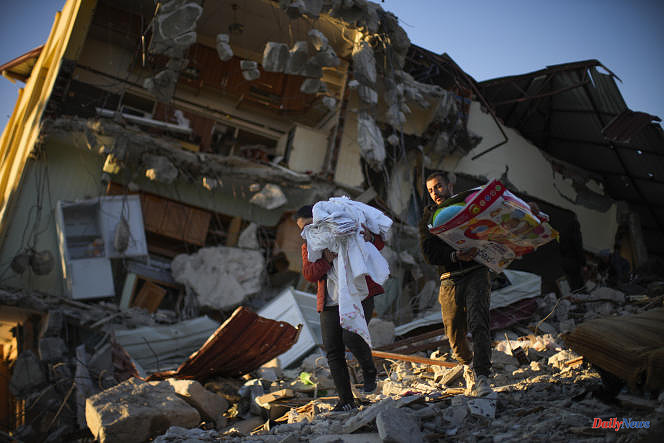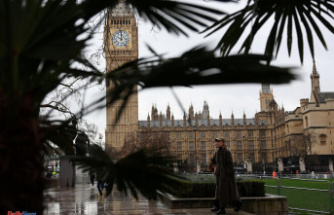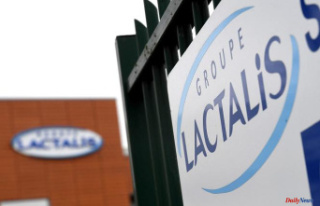Ten days after the earthquake that devastated Turkey and Syria, the United Nations (UN) launched an appeal for international assistance for Turkey on Thursday, February 16, as the global toll continues to increase and exceeds now the 41,000 dead in both countries.
According to official and medical sources, 41,732 people - 38,044 in Turkey and 3,688 in Syria - have now lost their lives after the 7.8 magnitude earthquake that devastated the border area between the two countries on February 6.
As the chances of finding survivors dim, Turkish rescuers pulled a 17-year-old girl and a woman in her 20s from the rubble on Thursday.
In many towns and villages in both countries, rescuers are still trying to help any survivors, but each hour that passes decreases the chances that they could have resisted, in the freezing cold, under the debris. . Turkey has therefore suspended rescue operations in some areas and the government of Syria, a country torn by war for twelve years, has done the same in areas it controls.
Faced with the deadliest natural disaster in Turkey's post-Ottoman history, the UN is urging the international community to provide financial assistance to the country in order to raise one billion dollars (nearly 950 million euros).
"The funding, which covers a period of three months, will assist 5.2 million people and enable aid organizations to step up their crucial support for government-led efforts" in "earthquake-hit Turkey." most devastating land in the country in a century," UN Secretary-General Antonio Guterres wrote in a statement.
He "urged the international community to do more and fully fund this vital effort to respond to one of the greatest natural disasters of our time."
"Turkey is home to the largest number of refugees in the world and has shown immense generosity to its neighbor Syria for years," the UN chief insisted.
"Now is the time for the world to support the people of Turkey, just as they have done with others seeking help," Mr. Guterres added, noting that "the needs were enormous, [that] people were suffering and [that] there was no time to waste”.
Asked about the number of people targeted by the call for donations - 5.2 million, almost double affected by the earthquake - the spokesperson for the Secretary General, Stéphane Dujarric, specified that the decision had been taken in consultation with the Turkish government. To “focus on the people most in need of help most quickly, and where the UN can be most effective,” he explained.
On Wednesday, Antonio Guterres had urged all member states to provide "without delay" almost 400 million dollars to guarantee "humanitarian aid which almost five million Syrians desperately need", starting with "shelter, medical care , food" for three months.
"The needs are immense" and "we all know that life-saving aid is not coming in at the necessary speed and scale," the Secretary General insisted. “A week after the devastating earthquakes, millions of people across the region are struggling to survive, homeless and facing freezing temperatures,” he added.
The difference in amount between the two countries is explained in particular by the fact that before the earthquake there was already a UN appeal to finance the humanitarian response plan for Syria, amounting to 4.8 billion dollars for 2023. , explained Stéphane Dujarric. This is not the case for Turkey.
On the other hand, ArcelorMittal, the second largest steel group in the world, describing a "heartbreaking" situation, announced a donation of 5 million dollars to help the victims of the earthquakes in Turkey and Syria, via the humanitarian organizations Doctors Without Borders and Disaster emergency committee.
Syrian President Bashar al-Assad on Thursday thanked his "Arab brothers" for the help provided after the deadly earthquake that prompted several countries in the region to break years of diplomatic silence with Damascus. Mr. Assad has thus received calls from leaders of several Arab countries, some of which had severed ties with the Syrian regime more than a decade ago due to the suppression of the 2011 popular uprising which degenerated into civil war.
Some 120 planes loaded with aid have also landed at the country's airports, around half of them from the United Arab Emirates, the first Gulf country to restore relations with Damascus by reopening its embassy in 2018.
"We cannot fail to express our thanks to all the countries that have stood by our side since the first hours of the disaster among our Arab brothers and friends," the Syrian president said in a televised speech on Thursday. "Their assistance had a major impact on strengthening our ability to cope with the difficult conditions during these critical hours," continued the president, whose country has suffered for nearly twelve years from a civil war that has claimed nearly half a million dead, ravaged infrastructure and displaced millions of people.
“The scale of the disaster and the tasks before us far exceed the means available,” Mr. Assad said, adding that the country would still face enormous social and economic challenges,
Bashar al-Assad found himself diplomatically isolated after the start of the civil war, especially among Arab countries, and at the end of 2011, Syria was excluded from the Arab League.
Efforts to help this country have been led by Abu Dhabi, which has helped break its isolation. Several other Arab countries have outlined an opening towards Damascus after the earthquake. Saudi Arabia has sent two planes carrying aid to Syria since Tuesday, after suspending flights for more than a decade.
Bashar al-Assad also met with the foreign ministers of the Emirates and Jordan in Damascus, and received calls from the leaders of Egypt, Bahrain and Jordan.












